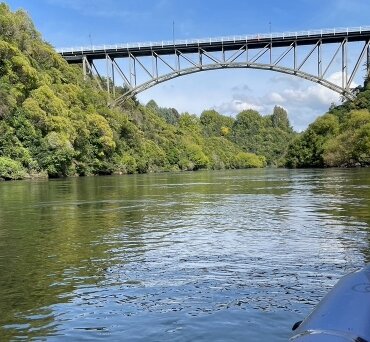
Long-standing Waipā councillor Clare St Pierre is “concerned” two Cambridge councillors have predetermined views on a third bridge over the Waikato River and say they should not be part of a project working group preparing a business case.
Proof the issue has quickly become a political hot potato for the upcoming local body elections came at this week’s Service Delivery committee when St Pierre opposed a move to appoint Roger Gordon and Philip Coles to the group which meets before the elections.
St Pierre quoted from The News article of November 4 which reported the two Cambridge ward representatives had become “new bridge advocates”.
“I’d be really concerned their predetermination would make it very difficult to actually take that broader view on the (options needed). It’s not just about a third bridge, it’s about managing the transport emissions,” she said.
Gordon responded caustically noting he and Coles were not the only ones to come out in favour of a third bridge.
“The mayor and the deputy mayor have both gone out and said there is a need for a third bridge in Cambridge. The (district) transportation strategy states there is a need for a third bridge,” he said.
“The identification of two individuals around this table from amongst many who have thought there is a need for a third bridge, I don’t think it’s acceptable.”
And just before mayoral candidate Susan O’Regan had a chance to add to the debate, Gordon chipped in with: “In fact Susan went public with the need for a third bridge in a recent statement.”
St Pierre later backtracked saying she may not have given Gordon a “fair hearing.”
Describing predetermination as “a tricky one,” O’Regan conceded there were a fair number of people around the council table who accepted a third bridge as a “likely eventuality.”
There was a “huge amount of work to be done with lots of moving parts and stakeholders” with pressure from Cambridge residents to resolve the issues.
Council staff were recommending they start work on a 12-month $300,000 ‘Cambridge Connections – Our Future Transport Plan’ business case to identify options and determine the preferred location for a third bridge that would deliver the most benefits and least environmental impacts.
It would also assess the town’s transport network.
O’Regan questioned both the cost and the timeframe given the upcoming work and partial closures on the historic Victoria (High Level) Bridge.
“We’re going to get put under a whole lot of pressure and there is already a lot of criticism we’ve sat on our hands on this one.”
She asked for traffic counts for Victoria and Ferguson (Low Level) bridges saying there was a perception the newer of the two bridges was underutilised.
Council staff later confirmed the number of vehicles crossing the bridges on an average day this year were 19,100 over Ferguson – up from 16,873 the previous year – and 14,900 – down from 15,320 – over Victoria.
Finance committee chair Andrew Brown supported the project process recommended by staff saying Waka Kotahi had to be onboard long term.
“It would be a ridiculous project for us to run on our own. It would be a very difficult project for us to fund.”
And he supported St Pierre’s comments around predetermination saying there was a difference between acknowledging it and campaigning on it in an election process.
Service Delivery chair Grahame Webber, who is standing down at this year’s election, said the average ratepayer did not understand the process.
“Waka Kotahi have got critical principles on traffic density before they 50 per cent fund a big project like this.
“It would be absolutely foolish for Waipā District Council to take it on themselves and enforce that high cost on all of the Waipā ratepayers.
“It’s simply unaffordable for ratepayers. And don’t forget, it’s funded district wide. The bridge is as important to the people in Te Awamutu as it is for the people of Cambridge.”
Webber, from Cambridge, said it was important councillors like St Pierre, who has represented Pirongia on the council since 2013 and has a track record of championing environmental projects, had an input.
“Once people can grasp there is so much money at stake and the impact on their rates, they will understand,” he said.
The committee appointed St Pierre, Gordon, deputy mayor Liz Stolwyk and representatives from the Cambridge Community Board and one of the four Te Kanohi iwi representatives to the project stakeholder group which will meet next month.















